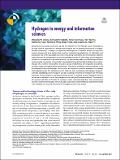Hydrogen in energy and information sciences
Author(s)
Chung, Heejung W.; Cladek, Bernadette; Hsiau, Yong-Yun; Hu, Yan-Yan; Page, Katharine; Perry, Nicola H.; Yildiz, Bilge; Haile, Sossina M.; ... Show more Show less
Download43577_2024_Article_714.pdf (2.347Mb)
Publisher with Creative Commons License
Publisher with Creative Commons License
Creative Commons Attribution
Terms of use
Metadata
Show full item recordAbstract
Beyond its fascinating chemistry as the first element in the Periodic Table, hydrogen is of high societal importance in energy technologies and of growing importance in energy-efficient computing. In energy, hydrogen has reemerged as a potential solution to long-term energy storage and as a carbon-free input for materials manufacturing. Its utilization and production rely on the availability of proton-conducting electrolytes and mixed proton–electron conductors for the components in fuel cells and electrolyzers. In computing, proton mediation of electronic properties has garnered attention for electrochemically controlled energy-efficient neuromorphic computing. Incorporation of substitutional and interstitial hydride ions in oxides, though only recently established, enables tuning of electronic and magnetic properties, inviting a range of possible exotic applications. This article addresses common themes in the fundamental science of hydrogen incorporation and transport in oxides as relevant to pressing technological needs. The content covers (1) lattice (or bulk) mechanisms of hydrogen transport, primarily addressing proton transport, but also touching on hydride ion transport; (2) interfacial transport; (3) exploitation of extreme external drivers to achieve unusual response; and (4) advances in methods to probe the hydrogen environment and transport pathway. The snapshot of research activities in the field of hydrogen-laden materials described here underscores exciting recent breakthroughs, remaining open questions, and breathtaking experimental tools now available for unveiling the nature of hydrogen in solid-state matter.
Date issued
2024-04-22Department
Massachusetts Institute of Technology. Department of Materials Science and Engineering; Massachusetts Institute of Technology. Department of Nuclear Science and EngineeringJournal
MRS Bulletin
Publisher
Springer Science and Business Media LLC
Citation
Chung, H.W., Cladek, B., Hsiau, YY. et al. Hydrogen in energy and information sciences. MRS Bulletin (2024).
Version: Final published version
ISSN
0883-7694
1938-1425